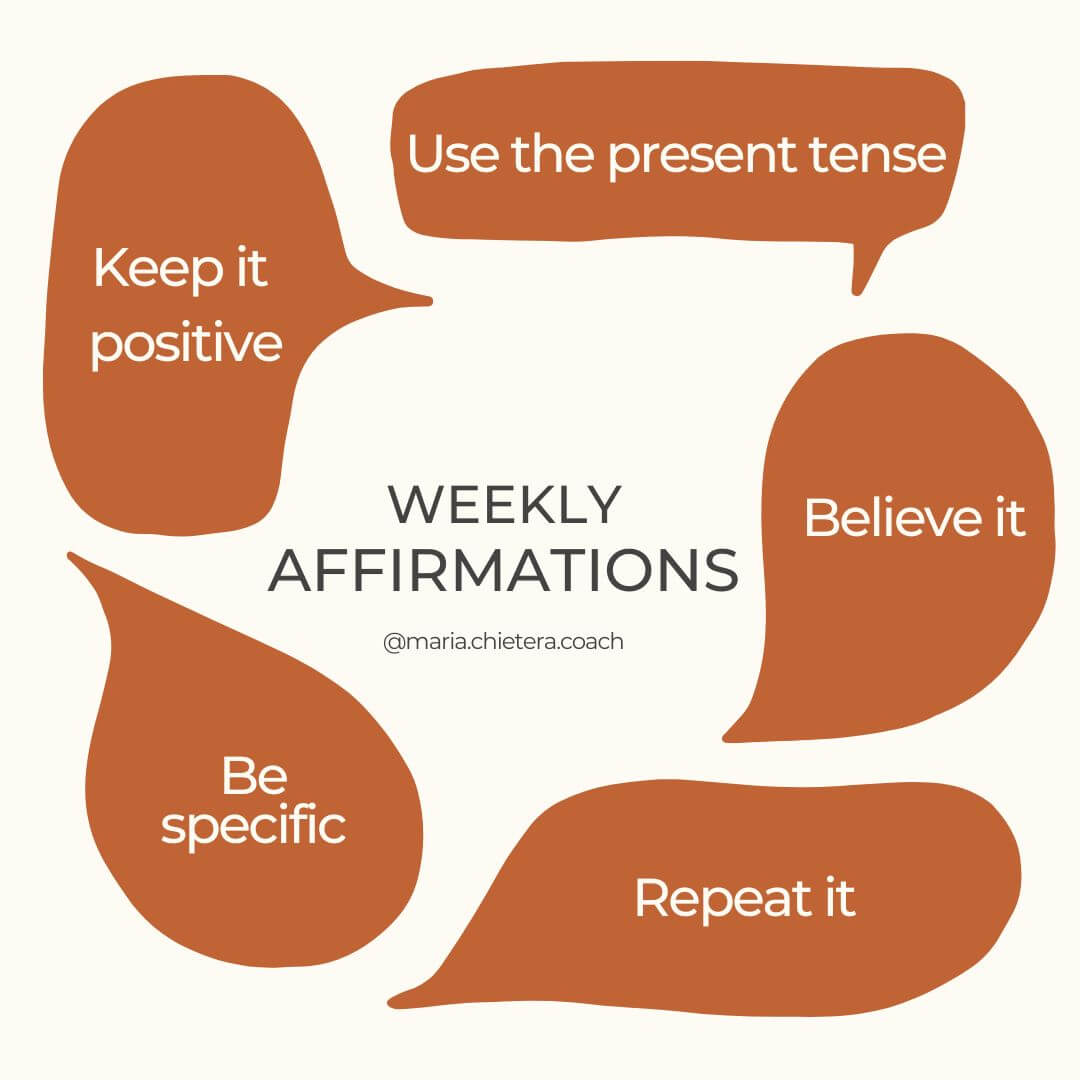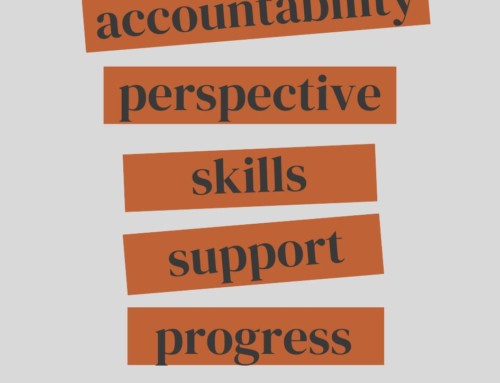The 5 steps to Craft Effective Affirmations and Focus on What Matters
Hey there, my lovely mindful fam!
If you’re one of my awesome followers on @maria.chietera.coach, you know that every Monday morning we start the week off right by choosing a super-charged affirmation to carry us through the next 7 days. And guess what? Since when I started I’ve been getting some seriously amazing messages from people who share with me how this simple yet powerful practice helps them throughout the week.
So, let’s take a step back.
What the heck is an affirmation anyway? Why does it work so well, and how can we make sure we’re getting the most out of it?
What is an affirmation and why it works?

Affirmations are powerful tools that can help us transform our thoughts, beliefs, and behaviours. They are positive statements with the aim of reshaping our subconscious mind and improving our outlook on life.
There’s quite some science showing that self-affirmations can help us to lower stress and rumination, improves our problem-solving skills and make us more resilient to difficulties when they arise.
Affirmations can be highly beneficial in many situations, regardless of the degree of challenge, from minor daily setbacks to significant stressors that impact one’s self-esteem, identity, or sense of control. We have in our hands a very transformative tool.
I hope we are on the same page by now: affirmations are cool. But making affirmations right is crucial to maximizing their impact.
So, how do we make Affirmations Right?
Here there’re a few tips.
Use the present tense.
Affirmations should always be in the present tense. This is because the brain responds better to positive statements that are framed in the present.
The present is immediate, and that right-nowness forces you to immerse in the reality you want to create for yourself as if you were already there. You could sense how you would feel, what you would see, and who would be around you.
For example, instead of saying, “I will be confident,” say, “I am confident.”
Keep it positive
Did you know that our brain cannot tell the difference between a negative and a positive statement? Let’s do an experiment.
Read this out loud “I do NOT think of an elephant”. You’ve just thought of an elephant, haven’t you?
More than being hilarious, this shows us why affirmations should always be positive statements. Negative statements can create a sense of resistance and negativity, which is not the energy we want to pursue when we want to create an opening and achieve the desired result.
For example, instead of saying, “I am not anxious,” say, “I react in a calm and centred way.”
Be specific
Affirmations should be specific and focused on a particular goal or outcome, or state of mind. This helps to create a clear vision of what you want to achieve, making it possible for us to actually get there and get our dopamine shot from the brain – our very important reinforcement and motivation chemical friend.
For example, instead of saying, “I am successful,” say, “I have achieved my career goals of this week.” This creates a more specific and meaningful statement that helps to create a clear path to success.
Believe it
Affirmations are only effective if you believe in them. If you don’t believe in the importance of your outcome, it will be hard to find the motivation to achieve the desired result. At this stage, it might be helpful to ask yourself, what is the cost of not fulfilling this affirmation?
If you don’t find a compelling answer to this question, maybe this is not the right affirmation for you at this time.
Moreover, It’s important to choose affirmations that resonate with you and feel authentic. Use your words so that you can relate to them and feel them as yours!

For example, “I create abundance in my life.” is a statement that would work for me, but a more analytical mind might want to choose “I am wealthy” instead.
Repeat it
Repetition is key to making affirmations effective. It’s important to repeat your affirmations daily, preferably several times a day. Over time, this helps to reinforce the positive statement in your mind, creating new neural pathways that support the desired outcome (thank you, neuroplasticity!). You can repeat your affirmations in the morning, before bed, or throughout the day.
It doesn’t matter when or how. Find your system!
On my fridge, I have a post-it saying ‘I let go of (the illusion of) perfectionism’ which I can read every time I step in the kitchen.
Next to my laptop, when I know an important presentation or interview is coming up, I always write ‘Breathe!’ next to the webcam.
At the beginning of my week, I always carve some time to come up with a leading affirmation to help me show up in my job and relationships the way I choose to.
Time to get your focus on! What’s your pick starting from today?
In conclusion, making affirmations right can really help us to make the best out of them.
By using the present tense, keeping it positive, being specific, believing it, and repeating it, we truly have a powerful ally to help us shift our mindset, but it requires practice and consistency.
We do not experience life as it objectively is but rather as we choose to direct our intention, focus and attention.
So what now? If you’re itching to begin your journey of self-improvement and want to master Affirmations and other helpful tools, I’ve got a little gift for you!
Simply hit the button below to download my Free Coaching Workbook. This bad girl will guide you in defining your current status and where you want to be on your path of personal growth. Happy exploring!
Thank you for reading.
With love,
Maria



